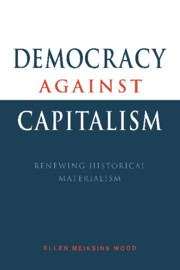Book contents
- Frontmatter
- Contents
- Acknowledgements
- Introduction
- I HISTORICAL MATERIALISM AND THE SPECIFICITY OF CAPITALISM
- 1 The separation of the ‘economic’ and the ‘political’ in capitalism
- 2 Rethinking base and superstructure
- 3 Class as process and relationship
- 4 History or technological determinism?
- 5 History or teleology? Marx versus Weber
- II DEMOCRACY AGAINST CAPITALISM
- Conclusion
- Index
4 - History or technological determinism?
Published online by Cambridge University Press: 13 October 2009
- Frontmatter
- Contents
- Acknowledgements
- Introduction
- I HISTORICAL MATERIALISM AND THE SPECIFICITY OF CAPITALISM
- 1 The separation of the ‘economic’ and the ‘political’ in capitalism
- 2 Rethinking base and superstructure
- 3 Class as process and relationship
- 4 History or technological determinism?
- 5 History or teleology? Marx versus Weber
- II DEMOCRACY AGAINST CAPITALISM
- Conclusion
- Index
Summary
We need to be reminded why Marxism ascribes a determinative primacy to class struggle. It is not because class is the only form of oppression or even the most frequent, consistent, or violent source of social conflict, but rather because its terrain is the social organization of production which creates the material conditions of existence itself. The first principle of historical materialism is not class or class struggle, but the organization of material life and social reproduction. Class enters the picture when access to the conditions of existence and to the means of appropriation are organized in class ways, that is, when some people are systematically compelled by differential access to the means of production or appropriation to transfer surplus labour to others.
The compulsion to transfer surplus labour can take different forms, with varying degrees of transparency. Capitalism undoubtedly represents a special case, because capitalist appropriation is not a distinctly visible act – like, say, the serf's payment of dues to the lord, which constitutes a separate act of appropriation, after the fact of the serf's labour and in the context of a transparent relationship between appropriator and producer. In contrast, there is no immediately obvious way of separating the act of capitalist appropriation from the process of production or from the process of commodity exchange through which capital realizes its gains. The concept of surplus value – as distinct from the more general category of surplus labour, which applies to all forms of surplus appropriation – is meant to convey this complex relation between production, realization in commodity exchange and capitalist appropriation.
- Type
- Chapter
- Information
- Democracy against CapitalismRenewing Historical Materialism, pp. 108 - 145Publisher: Cambridge University PressPrint publication year: 1995
- 1
- Cited by



